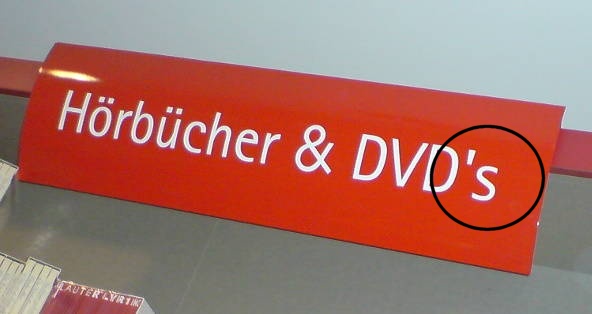

http://www.deutschseite.de
by ![]() Cathy & Tom
Cathy & Tom
last updated:
|
|
|
http://www.deutschseite.de |
|
| |||
German spelling |
apostrophe
| rule A01: Put an apostrophe for names of people in the genitive case , which end with s, ß, z, ce or x . |
example(s)

exception(s)
An exception are names of people in business, e.g. the names of companies, restaurants and shops, if the basic form of the name is not explicit:
hint(s)
The "s-genitive" is just used for animate things. You need the rule, if you speak about possession of human beings and animals.
The reason for this typical mistake is because you have to add a "s" to (almost) all nouns to form the plural in English.
Many English words were taking over into German and their spelling too.
A collection of wrong used apostrophes you find here: http://www.apostrophen-alarm.de
........................................................................................................................................................................
| rule A02: Put no apostrophe for the plural nouns and abbreviations, also not for nouns taken from English/French. |
example(s)

hint(s)
Hereby it doesn't matter in which case the noun is used. Also for the genitive don't put a comma.
| rule A03: Put an apostrophe if you leave out letters or words, but not if you join prepositions and articles. |
example(s)


hint(s)
If you leave out letters or whole words, to improve the "sound of the sentence", put an apostrophe.
If you join a proposition (mit, nach, bei, von zu, aus, für, in ...) and an article (der, die, das), don't put an apostrophe.
| summary Remember: There are just situations in German where you have to put an apostrophe:
|
exercises |
| |||||
summary - documents for your folder |
Apostrophe (theory, 3 pages) |
| ||